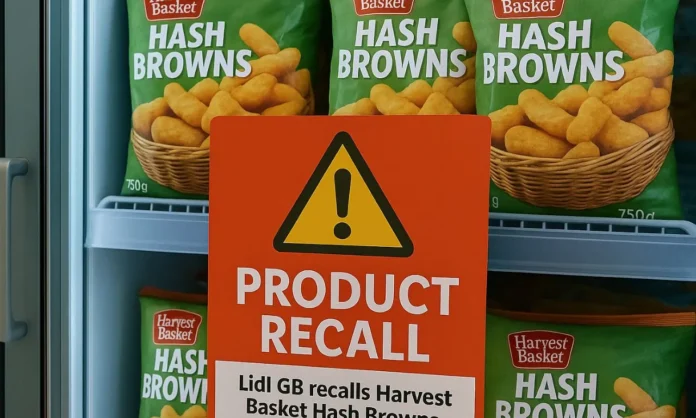Metal fragments in 750g frozen hash browns spark urgent UK-wide recall
Lidl GB has issued a product recall on its Harvest Basket Hash Browns (750g) after reports of potential metal contamination. The Food Standards Agency (FSA) confirmed the recall on 12 June 2025, citing a choking hazard and public health risk.
The recall applies to batch code 5144L with a best before date of 24 May 2027. It affects stores in England, Scotland, and Wales, and is not linked to Lidl’s operations in Northern Ireland.
The alert is classified as a Food Alert for Action, meaning immediate removal from shelves and communication with consumers and local authorities.
Lidl statement: “Customer safety is our top priority”
In a company-issued notice displayed in all affected stores, Lidl GB said:
“We take the quality and safety of our products extremely seriously. As a precautionary measure, we are recalling this batch of Harvest Basket Hash Browns due to the potential presence of small metal fragments. We apologise for any inconvenience caused and advise customers not to consume the product.”
Customers can return the item to any Lidl store for a full refund — no receipt needed.
Third-party food safety expert warns of supply chain gaps
GSN spoke with Dr. Naomi Rees, a food safety consultant formerly with the Chartered Institute of Environmental Health:
“While the presence of metal in processed foods is rare, it typically signals a breakdown in machinery control — often during slicing or packaging stages. What matters now is whether Lidl and its manufacturing partner conduct a root cause analysis to prevent recurrence.”
She added that metal fragments, even when small, are classed as Class I foreign objects — meaning they can cause injury or death if swallowed.
Product details at a glance
| Product | Harvest Basket Hash Browns |
|---|---|
| Pack size | 750g |
| Batch code | 5144L |
| Best before | 24 May 2027 |
| Risk | Metal contamination / choking hazard |
| Action | Recall + full refund |
| Region | England, Scotland, Wales only |
How does this compare to other UK supermarket recalls?
In 2025 alone, the UK supermarket sector has faced over 17 product recalls, many related to allergens or physical contamination:
-
Aldi recalled frozen chicken goujons in March due to rubber fragments.
-
Tesco pulled certain baby food pouches in April over mould risk.
-
Sainsbury’s issued an urgent recall on a batch of hummus containing pieces of plastic.
Lidl GB’s recall of hash browns ranks as one of the most serious foreign body alerts of the year due to the metal risk and broad regional impact.
Broader impact: What does this mean for frozen private label foods?
Harvest Basket is one of Lidl’s flagship private-label brands in the frozen category. It competes directly with:
-
Aldi’s Champion frozen range
-
Tesco’s Everyday Value
-
Asda’s Smart Price
While own-brand frozen foods have grown in popularity amid inflation, incidents like this test consumer trust — especially in low-cost staples that are often bought in bulk and stored for months.
Frozen potato products, including hash browns, account for a £400 million+ segment in UK retail. Lidl’s withdrawal of a key SKU will likely impact both customer perception and short-term category sales.
What’s next for Lidl and food safety compliance?
Lidl GB has not yet named the manufacturing partner responsible for the batch. FSA guidance urges companies to complete an internal investigation, report root causes, and ensure corrective measures.
The recall will also trigger additional checks from local authorities and FSA auditors, especially if the incident is traced back to non-UK production facilities — a common sourcing strategy for frozen vegetables and prepared foods.
Final thoughts: Private label trust under scrutiny again
This latest recall underscores an ongoing issue in European private label supply chains: quality assurance gaps at the manufacturing stage. While Lidl responded quickly, the incident will fuel renewed pressure on value retailers to invest in traceability and automation.
In a year where consumer trust is fragile and supply chains remain complex, food safety transparency isn’t just a regulatory requirement — it’s a competitive necessity.



